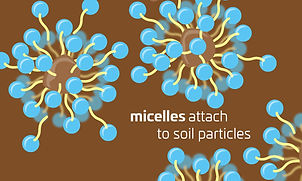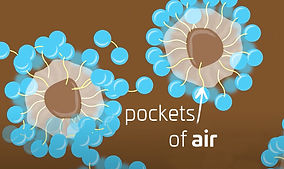Sustainability
With the use of water saving products increasing across the world it is important for farmers, growers and consumers to know they are safe to use and if they have long lasting effects on the soil or ground water or even the produce they are eating.
Sadly, many are made re-purposed chemistries from the agrochemical industry which are older, heavier chemical technologies which are not good for the environment. Whilst their short term use may provide farmers and growers with benefits in saving water, their long term use will have negative impacts on soil health, soil microbial activity and water quality and even the produce they sell.
At Engage Crop Solutions we believe that when a product is made, its environmental impact is vitally important. Not only to allow its long term use being sustainable, but also ensure the benefits it will bring are not outweighed by any negative impact from application over many months or even years.
Integrate has gone through rigorous scrutiny and not only have we built a product specifically for safely saving water but also the products base materials have been specifically chosen and extensively tested across 30 countries across the world over a 13 year period to fully prove the environmental sustainability and credentials of the technology. Integrate has been commercially used for over eight years in numerous countries, with no adverse effects on the environment or soil ever been reported.
How is Integrate environmentally safe?
The base materials of Integrate are four specially chosen water saving technologies. Three are carbon based micellular and the fourth is an organic glucose base surfactant used to deliver the micelles into the soil profile.
The organic glucose surfactant is made to be very short term in its life within soils. This, depending upon soil type is from 7 to 21 days as it quickly becomes food for soil microflora and plant roots use it as an energy source to absorb essential nutrients.
The micellular are slightly longer term in their longevity in the soil. Soil type, organic matter, soil temperature and soil microbial levels all play a part in how long they take to breakdown. In independent testing and in extensive field studies this is proven to be 8 to 12 weeks. The micelles breakdown into soil CO₂ (60%) and food for soil microflora.
As such Integrate is regarded as 100% biodegradable and having zero environmental fate.


Environmental Benefits of Integrate

1
Micellular adhesion
The micelles within Integrate carry a positive and negative charge which is attuned to the natural charge of soil particles. This has multiple benefits. The micelles once attached to soil particles remain in place until they are broken down by soil microflora to ensure they remain in the soil. This adhesion is instrumental in slowing the gravitational movement of water and nutrients, optimising availability for improved growth, yet saving up to 65% for both in application.

2
Oxygenation
The micelles within Integrate have tails which are hydrophilic so they repel water, creating pockets of air to maintain soil oxygen levels. This is vitally important for root cells to absorb water and nutrients for healthy crop growth and to support the aerobic microorganisms necessary for the degradation of organic compounds. It is also an essential factor in soil respiration and maintenance of soil structure to prevent compaction or capping which may lead to increased run- off into waterways.

3
Reduction in energy use
As Integrate reduces the amount of water and nutrients applied by up to 65%, it also reduces the energy required to pump the water annually. The cost of pumping water per hectare in energy depends on numerous factors, including the flow rate, fluid density and the vertical distance to be pumped. The energy required to pump water is calculated by multiplying the pumping power by the time. Environmentally, this
is important, as it reduces the carbon footprint impact.


